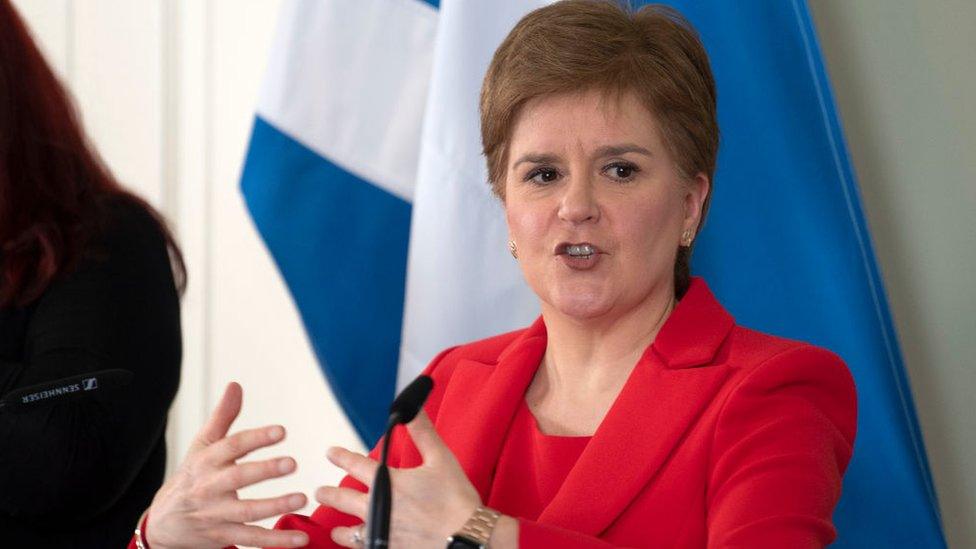Are we really one year away from a Scottish referendum?
- Published
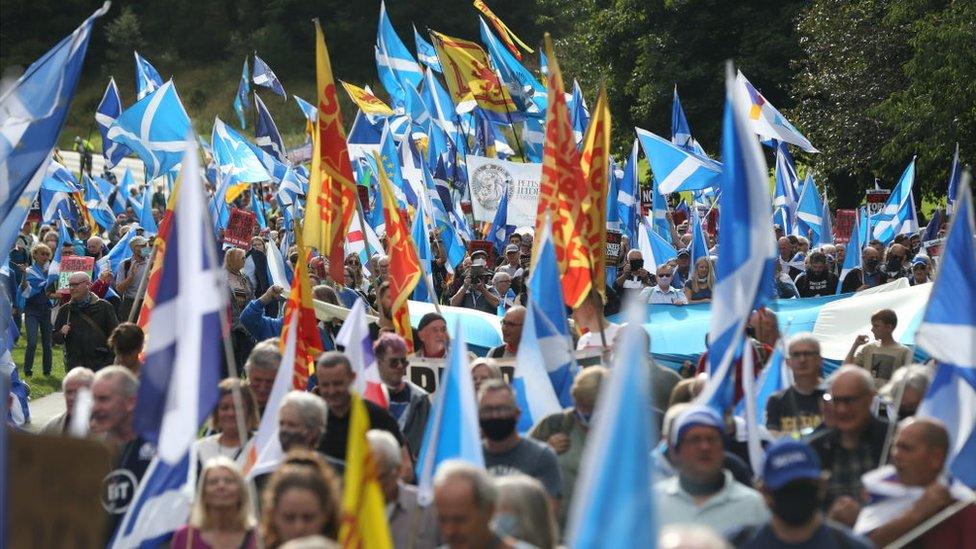
If First Minister Nicola Sturgeon's plans come to fruition, Scots will be voting in an independence referendum in exactly one year's time. But how likely is that to actually happen, and what are the practical and political questions which could prove crucial?

Can it be delivered?
It's certainly possible.
The question of process is currently in the hands of the Supreme Court, which is mulling over whether MSPs can legislate for a referendum without the formal consent of Westminster.
If judges give the green light, the SNP-Green majority at Holyrood could pass a bill in a matter of days.
There would be hoops to jump through in terms of actually setting up a vote, like the Electoral Commission testing the question - but from a practical standpoint, a referendum date of 19 October 2023 is entirely feasible.
On the pro-independence side, confidence is running high. The Scottish Green conference had the word "independence" emblazoned across the back of the stage, while the SNP's gathering included talk of "the arc of history moving firmly in its direction".
But of course there is every chance the court says no, or refuses to rule entirely.
And a legal victory would not necessarily guarantee a political one. Ms Sturgeon hopes the ruling will pile substantial pressure on the UK government to agree to a referendum.
But there is nothing to stop Westminster continuing to argue that "now is not the time" and urging people opposed to independence to boycott the vote to undermine the credibility of the result - as happened in Catalonia in 2017.
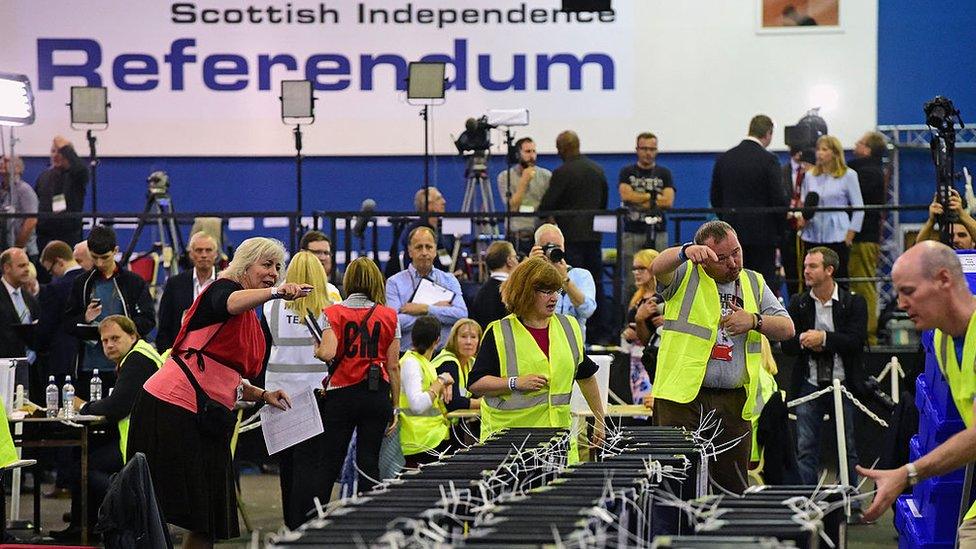
A referendum is a complicated thing to set up, but a majority government could in theory deliver it inside a year
Is a political deal possible?
This is the key question, because Ms Sturgeon has always been clear that she wants a "gold standard" agreement to pave the way to an internationally-recognised referendum.
Her government claimed in court that an "advisory" referendum would be within Holyrood's remit - but that argument accepts that it would need Westminster to actually deliver on the result.
The problem all along has been that the UK government refuses to engage, and there is no sign of that changing.
Liz Truss is locked in a daily battle to stay in office as prime minister. The chances of her signing up to such a career-defining contest any time soon are, frankly, zero.
And if she is turfed out, the equation would not change much for her successor - they would have their hands full trying to tame a restless economy and parliament.
In short, the entire focus of the Westminster system is on its own future, not that of the union.
And while chaos there is undoubtedly a gift to independence campaigners, it creates a deadlock which is hardly conducive to moving the issue along.
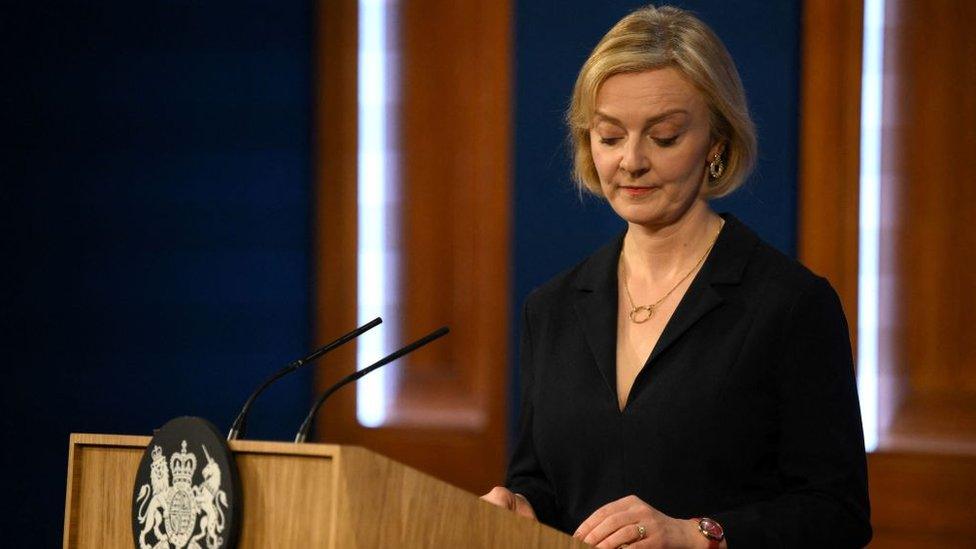
Liz Truss may feel she has enough on her plate without adding a referendum campaign
Is the campaign ready?
While questions persist over the "how" of independence, Ms Sturgeon is keen to push forward with the "why" - and has been publishing a series of papers aimed at setting out the case.
The most recent one focused on economic arguments, outlining plans for a Scottish Pound and proposing how border arrangements could work with the remaining UK.
The backdrop of a fourth Chancellor in four months ripping up the UK government's entire fiscal plan on the same day could not have been much more helpful.
But there are still a lot of unanswered questions. For example the economy paper was based entirely on the idea of Scotland becoming a full member of the EU, but the tricky detail of how and when that could happen has been saved for a later publication.
And uncertain economic circumstances coupled with the need for negotiation with UK counterparts who refuse to engage mean the paper was actually more vague than previous policy efforts.
The SNP's growth commission paper of 2018, external offered many of the same ideas, but actually indicated a rough timescale for the move to a Scottish Pound and put a value on debt-servicing "solidarity payments". Those proposals remain, but without the detail.
Obviously there's been a pandemic and a financial meltdown since that paper was written, but it provided an expectation that these kind of questions can in fact be answered.
FM Nicola Sturgeon said Scotland would continue to use the pound sterling while the Scottish pound is introduced in a "careful and responsible phased approach".
And on the other side of the debate, there is really no campaign at all.
Labour were badly burned by the experience of working with the Conservatives in 2014, and are currently going all-out against them. The Lib Dems also took some harsh lessons from the era of coalition government.
So there isn't going to be a Better Together 2.0, and nobody has seriously addressed the question of what would take its place.
There is also a question as to whether the public is ready for a referendum, in the midst of a cost of living crisis.
The SNP point to an ever-growing run of electoral successes as underlining appetite for a vote, but will equally be wary of moving too quickly and falling short.
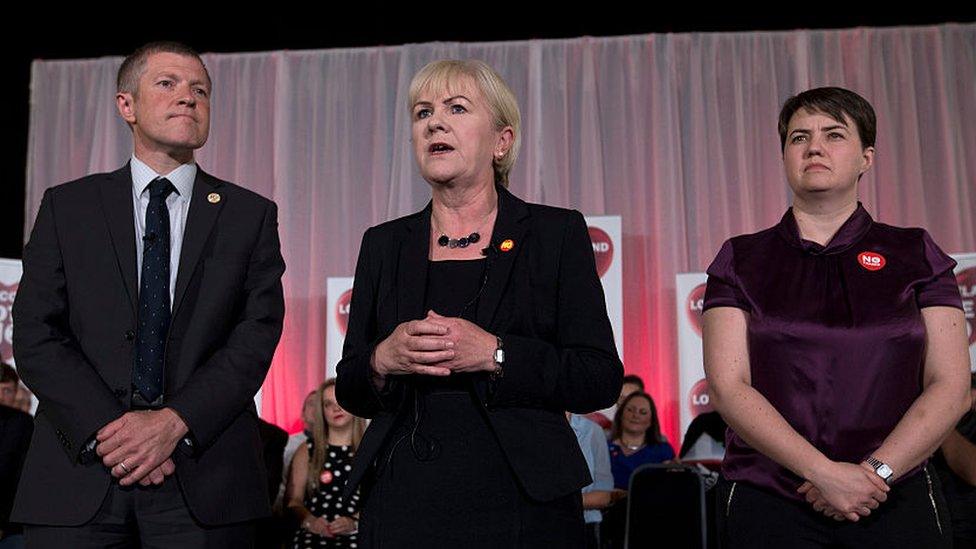
The chances of the Lib Dems, Labour and Conservatives sharing a stage now as they did ahead of the 2014 referendum are effectively zero
If not now, when?
Predictions are a mug's game in politics, particularly in these fast-moving times. But as things stand, a referendum on 19 October 2023 does not look a hugely likely prospect to me.
The crucial point though is that this is not an issue that's going to fade away after that date. And that's a question for unionist parties as much as it is for those which back independence.
Do they really want to leave the issue festering, and continue to take electoral drubbings in contests characterised by the constitution? How do they propose to deal with it, if the public continues to vote in large numbers for parties which back it?
Ms Sturgeon certainly has her sights set on the next general election, which she says she would seek to use in lieu of a referendum, targeting 50% of the vote.
That's an incredibly high bar to pass, and given it would not be accepted as a single-issue poll by the Conservatives or Labour it would also be highly unlikely to carry the sort of broad agreement and international recognition Ms Sturgeon needs to deliver independence.
But she can always throw that back at the pro-UK parties. If this is such a terrible plan, how can it be the only route left open to her? Why not settle this properly, with a referendum?
The question may be whether the next election produces a UK government that's more amenable to a referendum - or one that's reliant on SNP votes, which would put Ms Sturgeon's party in a powerful position regardless of what percentage of the vote she wins.
- Published17 October 2022
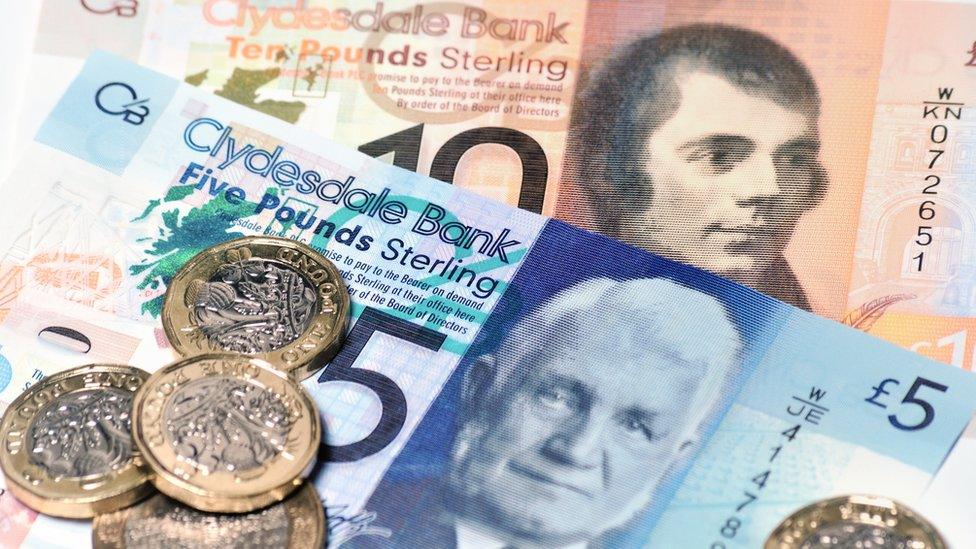
- Published17 October 2022
